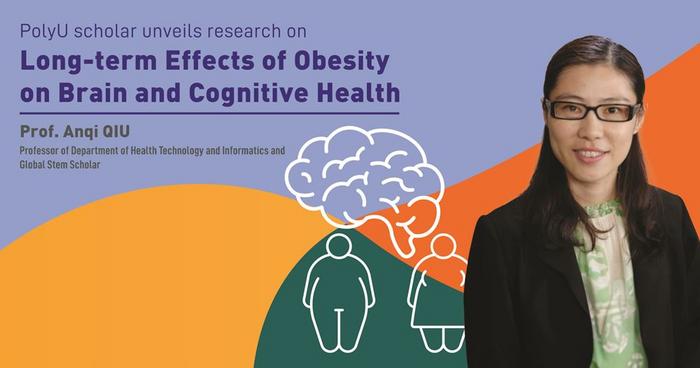As the global epidemic of obesity continues to escalate, researchers are compelled to delve deeper into the accompanying neurological ramifications. The impact of obesity stretches far beyond physical health, intricately entwined with brain and cognitive functions. Recent groundbreaking research led by Professor Anqi QIU from the Hong Kong Polytechnic University seeks to unravel these complex interactions, aiming to shed light on how long-term obesity influences brain health and cognitive performance over time.
Prof. QIU, a distinguished figure in the Department of Health Technology and Informatics, has embarked on an ambitious study focusing on the overarching theme of obesity’s longitudinal effects on neurological health. Unlike traditional studies that often rely on cross-sectional data, this research utilizes a comprehensive longitudinal approach that follows participants across diverse obesity trajectories, thereby illuminating the long-term interplay between obesity and cognitive health dynamics.
Obesity often presents a multifaceted challenge, with its implications for brain health still not fully understood. Traditional studies have established that obesity is correlated with various neurological disorders, yet they often fail to differentiate between transient weight issues and chronic conditions. By engaging in a longitudinal analysis, Prof. QIU’s team distinguishes among various obesity patterns, potentially paving the way for tailored interventions that could mitigate cognitive decline.
Employing extensive data drawn from the UK Biobank—which boasts a repository of health information from over 500,000 individuals—this pivotal study identifies five distinct obesity trajectories: low-stable, moderate-stable, high-stable, increasing, and decreasing. This nuanced classification challenges conventional views, positing that the trajectory of obesity, rather than merely the current weight, may be a key determinant of brain health outcomes.
One of the most compelling findings from this research is the stark contrast observed between individuals on decreasing obesity paths and those remaining in stable low, moderate, or high categories. Participants whose body mass index (BMI) improved over time demonstrated surprisingly minimal negative effects on brain structure and cognitive assessments. This suggests that efforts aimed at reducing body weight can substantially benefit neurological integrity and cognitive function.
As increasing weight patterns were closely associated with marked degradation in both structural brain integrity and cognitive ability, the study delineates how these impacts escalate across different trajectories. For instance, those categorized within the increasing trajectory showed early detrimental effects affecting the fronto-mesolimbic regions, an area critical for reward processing and decision-making. This degradation then expanded to affect parietal and temporal regions, where impaired cognitive functions may manifest as deficits in spatial awareness and memory.
The research, published in the prestigious journal Nature Mental Health, provides a paradigm shift in our understanding of obesity’s role in brain health. The evidence points to a strong correlation between sustained obesity and accelerated aging of the brain, with implications suggesting that chronic obesity could serve as a biomarker for cognitive decline and neurodegeneration.
Historical context provides depth to these findings; neurodegenerative diseases such as Alzheimer’s and Parkinson’s have increasingly burdened healthcare systems worldwide. The rising prevalence of these conditions among an aging population demands a critical focus on modifiable risk factors such as obesity. Prof. QIU’s research posits that maintaining a healthy weight across an individual’s lifespan could be instrumental in staving off cognitive decline and preserving brain function.
Moreover, given the complexity and variability inherent to brain health, this groundbreaking investigation underscores the necessity for a multifaceted approach to obesity management. Coordinated efforts aimed at weight loss, coupled with cognitive preservation strategies, might facilitate enhanced outcomes in an aging society grappling with neurodegenerative disorders.
As we look toward the future, the research team under Prof. QIU’s guidance plans to broaden this inquiry. There are exciting prospects for leveraging multi-omics approaches—combining genomics, transcriptomics, and proteomics—to decode the biological underpinnings that link obesity with alterations in brain functionality and overall health. This integrative method could unveil novel therapeutic targets, providing further avenues for intervention.
Ultimately, the ambitious scope of this research extends beyond academic interest; it poses vital questions about societal health. With obesity on the rise globally, understanding its neurological implications is crucial for shaping public health policies and personal health interventions alike. The hope is that this research will galvanize action towards a holistic understanding of weight management as both a public health priority and a personal responsibility, where the stakes include cognitive longevity and quality of life.
The findings of this study offer a clarion call for those interested in the interplay between physical health and cognitive function. By highlighting the complexity of obesity’s impact on the brain, researchers like Prof. QIU empower individuals to recognize the importance of weight management—not just for physical health but as an integral component of cognitive vitality. Such insights hold transformative potential for healthcare strategies aimed at combating the escalating tide of obesity and its related impairments.
In essence, Prof. QIU’s revelations demand further dialogue within medical communities, encouraging a re-evaluation of how obesity is approached in clinical settings. There is an urgent need for policies that promote not only weight loss but also sustained weight management practices, essential for long-term cognitive health.
To truly address the dual challenges of obesity and cognitive decline, future research must persist in exploring and documenting the nuanced relationships that exist between them. By doing so, the scientific community can inform more effective strategies to protect and promote brain health in an increasingly obese world.
Subject of Research: The long-term effects of obesity on brain and cognitive health
Article Title: Long-term obesity impacts brain morphology, functional connectivity and cognition in adults
News Publication Date: 3-Mar-2025
Web References: Nature Mental Health
References: Prof. Anqi QIU, The Hong Kong Polytechnic University
Image Credits: © 2025 Research and Innovation Office, The Hong Kong Polytechnic University. All Rights Reserved.
Keywords: Obesity, Cognitive Function, Brain Health, Longitudinal Studies, Neurodegenerative Diseases, Alzheimer’s Disease, Health Psychology.




